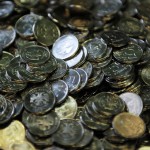Gold futures were on the losing side during early trade in Europe today, as investors eye upcoming US employment data, seeking to further reinforce speculation of a rate hike, supporting the dollar. The ECB decision to lower lending rate to 0.05% weighed on the euro, further supporting the greenback. Meanwhile, developments over the crisis in Ukraine are also on the agenda, with EU and NATO discussing responses to Russian aggression, while Kiev begins peace talks with the rebels.
Gold futures for December delivery on the Comex in New York traded at $1 264.4 per troy ounce, down 0.17%, at 6:46 GMT. Prices ranged from a three-month low of $1 258.0 to $1 266.4 per troy ounce. The precious metal dropped 0.3% yesterday and is headed for a ~2% weekly loss.
Silver for September delivery stood for a 0.08% daily drop at $19.123 per troy ounce, December palladium was down 0.07% at $890.40. October platinum was down 0.10% at $1 406.90.
The European Central Bank decided to lower the benchmark lending rate to 0.05%, the lowest level ever, amid pressure for action in light of downbeat economic data from the Eurozone. Although there was pressure for some form of monetary stimulus, the cut was largely unexpected and drove the euro to a new 14-month low, while the US dollar saw a massive surge to reach a new 14-month peak.
The US dollar is a major influence on gold prices, because gold, like most other commodities, is denominated in dollars. Hence, a stronger greenback increases the cost of gold to foreign currencies, lowering the precious metal’s investment appeal.
Also, the ECB deposit rate was pushed further into the negative at -0.2%, also the lowest on record. A negative deposit rate means the ECB is charging commercial banks money to keep their money in vault, effectively promoting more lending. Further still, the ECB announced the resumption of two bonds purchasing programs, strengthening euro bears.
Meanwhile, ADP’s flash payrolls figure pared some of the positive sentiment for the dollar, showing the US economy had added 204 000 new jobs in August, some 20 000 below expectations. The official government report is due later today, with US unemployment set for a six-year low at 6.1%.
Ukraine
Events in Ukraine are as close to unfolding as ever today, as a number of events could shape the conflict and the long-term geopolitical outlook in Europe.
Foremost, peace talks between rebels and Kiev are set to begin today, after Ukrainian President Petro Poroshenko and his Russian counterpart Vladimir Putin agreed to have the peace process initiated.
The talks come after rebels directly assisted by Russian military, according to NATO, made significant advances against government troops recently.
The EU could also announce further sanctions against Russia today.
Meanwhile, NATO holds its summit in Wales, with security in Eastern Europe and response to Russian aggression high on the agenda. Ukraine lawmakers yesterday approved of the countrys decision to bid for NATO membership, souring relations with the Kremlin just ahead of the scheduled peace talks with the rebels.
Investors buy gold, lifting its price, when there is a higher risk of political or economical instability.
On Ukraine investors continued betting on peace, as signaled by the drop in assets at the SPDR Gold Trust. Gold holdings dropped ~5 tons on Thursday for a total of some 10-ton drop this week, reaching the lowest level in more than two months, losing in sync with gold prices.
Technical support and resistance levels
According to Binary Tribune’s daily analysis, December gold’s central pivot point on the COMEX stands at $1 269.0. In case futures manage to breach the first resistance level at $1 276.8, the contract will probably continue up to test $1 286.9. In case the second key resistance is broken, the precious metal will likely attempt to advance to $1 294.7.
If the contract manages to breach the first key support at $1 258.9, it will probably continue to slide and test $1 251.1. With this second key support broken, the movement to the downside may extend to $1 241.0.





